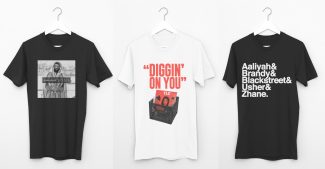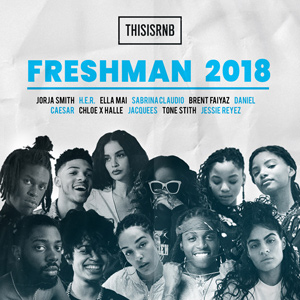2020 may be off to a rough start, but one thing we appreciate the most is the return of talented crooner Adrian Marcel to the stage. Rising to prominence under the mentorship of the legendary Raphael Saadiq, the Oakland native released his critically acclaimed debut mixtape 7 Days of WEAK in 2013 and within one short year, followed up with the successful Sage the Gemini single “2AM.” Taking his newfound stardom by the reigns, Marcel then released his follow-up project, Weak After Next that same year.
Though fans expected to immediately see a debut album from Marcel, it wasn’t until 2017 that GMFU (Got Me F***ed Up) would hit shelves for fans to enjoy. And while the years in between its release and the release of his brilliant new album, 98TH, have seen him make his acting debut as James DeBarge in The Bobby DeBarge Story, released a clothing line, and much more, fans are more than appreciative of the catchy new R&B music he’s delivered.
ThisIsRnB caught up with him recently to discuss his new album, being on his own label, his recent tour, his overall view of R&B and what he has planned for 2020. Get into it below.
TIRNB: The new album is called 98TH can you talk a bit about the meaning behind the title and what your goal was when making this album?
AM: I wanted to create vibe music. There was no clear name for it. As executive producer, I just knew I needed to get back into the space of creating a body of work that stood against the rest of my work. As I began to catch that groove, I started realizing the stories, melodies and references I was using was like my reintroduction to the people. So, I wanted to know how I could say I am reborn again without saying “rebirth.” I had to be careful with the name. I couldn’t call it Adrian Marcel or AM because I felt I’d be cheating people. I remember writing down 98th and I was looking at the signs and the way everything was changing while the music was playing and I said “Yo! This is the perfect vibe of what I remember my youth to be — just living in your vibe and space.” That idea then sparked everything else.
TIRNB: What did you want your fans to take away after listening to it and how it differs from prior projects?
AM: I wanted my fans to understand that it was because of nobody else but myself, but not in a cocky or pretentious way at all. If it is a shot at anyone, it is shot at myself. I was leaning on everyone else for so long. I watched myself become very uncreative. You get so use to everyone else’s opinions or what they want to see. You don’t even know half the people working your record. You get use to just being an artist and singing. Self-consciously, I was unfulfilled. I was searching for how I could be more useful. With 98TH, I wanted my fans to understand I am exactly who they claim me to be for myself. 98TH wasn’t for the fans at all; it was for me if anything. Yes, I wanted them to have new music and I wanted it to be for those who have been waiting, but I wasn’t looking to gain a bunch of new fans or outdo my prior projects. I was just looking to prove to myself that I could produce it and write it. I needed to step up for myself and follow through. That’s what this album allowed me to do. As long as I knew I liked it, I knew my fans would like it because I’m very honest about my music.
TIRNB: When making the album, what song set the tone for the rest of the album?
AM: The song that I knew we had a sound and we were onto something was “The Way.” I remember sitting with my producer KiddJupiter. He was the first person to teach me production. I was playing around with some chords. From there, he came and did his editing thing and I had the beat. I remember being afraid of it at first because the beat was fire. I sent it to James and he sent me back this verse and I said “Oh, okay I see exactly what this is.” I was listening to some older music that day and the Hi-Five sample popped out. From there, it was over with. I knew exactly what we needed to do. Every song had to feel like this. Every song had to feel like it goes with this.
TIRNB: You have tons of great records on this new one, my favorites are “The Way,” “These Days,” and “#1 Fan.” Was it difficult choosing the first single? What led you to go with “Slow Burn?”
AM: The album has a lot of behind the scenes symbolic things in it about the way I see relationships and life. For example, “IZ U Rockin” went last because I wanted to know after all of this are y’all rocking with me still? “Slow Burn” was symbolic because yes, it was talking about vibes and relationships and all that, but underneath it was a message to myself. The “girl” is my life. I’m talking to my life. “No stress, this is going to be a slow burn.” This was the time I knew I needed to step up, start my own label, learn my business, start a nonprofit, start a clothing line, etc. When you can finish and executive produce an album on your own time, that becomes infectious. You take that blueprint and you start something new and apply it to that new endeavor. I knew what I wanted to do was going to be a slow burn. I wanted that to be first record because I wanted that to be the stamp. Like this is going to be a slow burn, but I promise you this is going to burn through.
TIRNB: I like that because it ties back to the thought that part of making this album was proving to yourself that you could do it on your own terms. That if it comes out just as good — if not better than — as when you had the ability to lean on a label. So the fact that you released “Slow Burn” as another reminder to yourself, I like the continuity between all of that.
You’re on your own label right now, can you talk about the importance of ownership and how you’ve been able to navigate the industry juggling multiple hats?
AM: Having a label now has been such huge learning experience, but it’s learning as you go. For so long, I gave up so much of my authority and my abilities to conform. When I started my label, it opened my eyes to what I was capable of and it showed me that ownership was really power. When I started to take accountability, that’s when I started to feel this certain satisfaction that starts to propel you forward. It becomes infectious. The feeling of you being in control of you. The problem is, some people are afraid of it because of the tasks that come with it. The detail it takes. You have to really sacrifice effort and time when it comes to it being all on you. That’s why people run from it. In whatever you do, do it because you want to create the platform. Do it to become a true boss. I’ve learned how to build something. It made me fall in love with working again. The one thing I want to do is take care of my family. I was thinking I had to be the number one artist, but instead you can be a really good business man. You can make a business out of everything you love doing to live the life you want to live, take care of your family and be truly fulfilled.
TIRNB: That’s what’s so dope. You’re in it for the right reasons because If you’re just in it for the glitz and glamor you’ll forget that you can make a living and do what you love and take care of your family if you have the right intentions. I think the fact that you see it as a long game is why you’ve been able to take a year or two off and come back and still have the fans because it never feels inauthentic when you come out which is something I admire.
AM: I appreciate that.
TIRNB: Can you tell us a little bit about your nonprofit and what the mission is behind that?
AM: It’s called Marcel University. It’s about empowering young artists that are aspiring to be great. I started it at my high school. Alot of alumni have spoken to them before but we were the first to come in and ultimately create a curriculum for the kids. We do it every year which is dope. We start with masterclasses. We empower them to invest in themselves and believe in themselves. Every year I start by asking, “How many of you want to be signed?” Most raise their hand. Then I ask them “Why?” and it’s always about financial stability. I laugh a bit and tell them, “If you think that is what is comes out of that, you have a rude awakening coming.” It teaches them they have to work for themselves. I just learned this way of thinking after taking two years off to learn about my masters, royalties, publishing and music administration. All of these things have so much to do with you collecting your “bag.” That goes outside of your touring and streaming money. It also teaches them networking. It teaches them they have the resources underneath their nose right now. You’re dying to go work with this producer because he just had six hits on the radio, but you have the next dope producer/composer sitting right next to you and you’re not utilizing them. It’s really a mentorship program in many ways, but we have a curriculum set so that each time we meet once a month we are teaching them a new aspect of the business. Then we go into the artist development side of things. At the end of the year, they create an EP based on groups we have put them in to create songs and review how they handled the business of their music.
TIRNB: You’re currently on the 98TH tour which has been received very well by fans. For folks who have yet to see you live, how would you describe an Adrian Marcel show?
AM: You know it’s an experience from what I hear. I can’t lie, lately I’ve shocked myself in the way I’ve begun to own it onstage. I’ve always enjoyed performing, but I think the feeling of ownership has evolved my artistry as well. Ways I was uncomfortable sometimes just overthinking, I don’t think that way anymore. I’m even more free on stage. So, I must admit I’ve kinda shocked myself on this tour by the way I’ve been able to connect and the things I’ve tapped into. It’s a moment. An ultimate connection. It’s for you to get a real sense of my world and my aura. It’s kinda funny to see it back on video because Im like “woah I don’t remember doing that.” The audience drives the show. I’ll be candid with you, the first time I ran the show was at soundcheck. I put it together with an incredible musical director, Dave Jackson. I wasn’t taking a band with me, so I needed the music to be locked in. We met up at the top of January and we started taking two or three nights to put the music together and think about what I wanted to do. I always gotta account for having a certain level of showmanship in my show. I try to do things that I know will have that “wow effect” because there’s no fireworks or smoke. As long as I knew I had that down, I was like I’m cool because I had all these other things to focus on. So once we got to soundcheck, I just ran through it. After we did the first show, I saw it. Philly was the next show and it was like ‘alright, I got it now.’ I was even more loose. I’m bringing fans into 98th. This is who I was at 15, but now as a grown man. I was trying to be this guy at 15 and now I’m onstage being him.
TIRNB: I know you mentioned performing “Imagination” is a personal favorite moment for you in the show. Is there a song that gets a reception far beyond what you anticipated it to?
AM: There are two of them. One is “Automatic.” I didn’t know “Automatic” would be received that way. Every time it starts people are like, “OMG! Yes, this is my song. I’m ready.” Even more than that one though is “These Days.” I knew I loved it, but I wasn’t sure if it was going to go over well because the chorus isn’t very big. I knew that the beat would hold at least something, but when that song comes on, people lose it and I’m like wow. It gets me juiced. When that part is coming up, we are about to take them up a notch. The live version gets a special twist, but I don’t want to give the surprise away.
TIRNB: Great male artists like yourself, Kevin Ross, and Avery Wilson don’t often get the same mainstream recognition as female R&B artists such as Summer Walker, Ari Lennox, and SZA. Why do you think that is and how do you feel about the current state of R&B?
AM: Well, rap and hip-hop are the biggest genre of music. Everyone wants to add it to their music now. When it comes to the R&B guys, like the ones you named, we aren’t conforming. We are still trying to look like R&B guys. Alot of R&B has become hip-hop/rap. It’s gotten hard and even more thuggish. The most thuggish R&B was Jodeci back in the day and that still wasn’t too thuggish or hard. Now R&B singers are dressed like rappers and you can’t really tell the difference. With women, it’s different. Women are beautiful so it makes it alot easier. As far as the state of R&B, it’s heading in a better place. Everything goes in a cycle. It goes away and makes changes and then comes back. As artist, we have to learn to maintain through the changes without losing our authenticity. Look at an artist like Maxwell. He can still sell out Staples Center by himself. That proves to me it’s about your work. Make sure you’re creating music that’s worthy and your fans will still be there.
TIRNB: What’s next for you in 2020?
AM: Honestly, we are wrapping up the tour in March. It would behoove me to leave it at that. Before I left, I made sure I put in legwork for two new projects. In the next few months, I’m definitely dropping a couple projects and going right back on the road. So, new music, new tour and more merchandise from my clothing line. Other than that, we will see because I don’t even know [laughs].
*This interview was conducted prior to the COVID-19 pandemic. Since then, the final show has been rescheduled. To stay updated on its new date, visit adrianmarcelmusic.com.
Interview by Dai Poole




